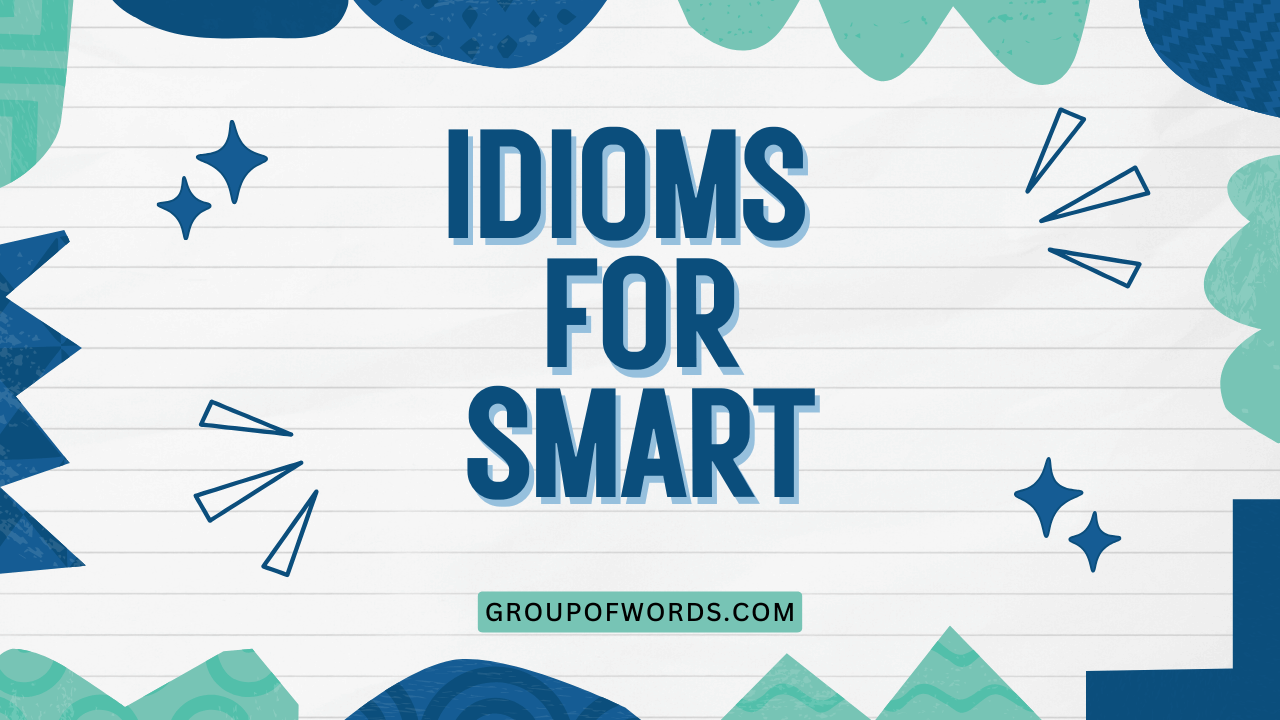Idioms for Smart: Mastering English Expressions
Understanding idioms is crucial for mastering English, as they add color and nuance to everyday conversation. This article focuses on idioms related to intelligence and knowledge, providing a comprehensive guide for English learners.
Mastering these expressions will enhance your comprehension and fluency, allowing you to communicate more effectively and understand native speakers better. Whether you’re a beginner or an advanced learner, this guide will equip you with the knowledge and practice to confidently use idioms for “smart” in various contexts.
By delving into these idioms, you’ll not only expand your vocabulary but also gain insights into the cultural context that shapes their usage. This article is designed to be accessible and engaging, with clear explanations, examples, and practice exercises to reinforce your learning.
Prepare to unlock a new level of English proficiency as we explore the fascinating world of idioms for “smart.”
Table of Contents
- Definition of Idioms for “Smart”
- Structural Breakdown of Idioms
- Types and Categories of Idioms for “Smart”
- Examples of Idioms for “Smart”
- Usage Rules for Idioms
- Common Mistakes with Idioms
- Practice Exercises
- Advanced Topics
- Frequently Asked Questions
- Conclusion
Definition of Idioms for “Smart”
Idioms are expressions whose meanings cannot be understood from the literal meanings of the individual words. They are a type of figurative language that adds depth and color to communication.
Idioms for “smart” are phrases that describe intelligence, knowledge, or cleverness in a non-literal way. These idioms often reflect cultural values and historical contexts, making them an integral part of understanding English language and culture.
Understanding idioms is crucial for both comprehension and effective communication.
These idioms can be classified based on the type of intelligence they describe, such as general intelligence, quick thinking, or academic prowess. Their function is to provide a more vivid and nuanced way of expressing someone’s intellectual abilities.
The context in which these idioms are used can vary, ranging from formal academic settings to informal everyday conversations. Recognizing the context is essential for using these idioms appropriately.
Structural Breakdown of Idioms
Idioms, by their nature, defy simple structural analysis because their meaning is not derived from the individual words. However, understanding the common structures in which idioms appear can aid in their recognition and use.
Many idioms follow a verb-object pattern, while others are prepositional phrases or similes. Recognizing these patterns can help you identify idioms within a sentence.
Idioms often contain metaphorical or figurative language, making it difficult to dissect their structure literally. For example, the idiom “sharp as a tack” uses a simile to describe someone’s intelligence, but the individual words do not directly relate to intelligence. The structure of this idiom is: adjective + as + a + noun. Other idioms may involve verbs and objects, such as “have a good head on one’s shoulders,” where the structure is: verb + object + prepositional phrase. Understanding these underlying structures can help in memorizing and using idioms correctly.
Types and Categories of Idioms for “Smart”
Idioms that describe intelligence can be categorized based on the specific aspect of intelligence they highlight. These categories include general intelligence, quick thinking, knowledge, cleverness, and academic prowess.
Each category has its own set of idioms that convey a particular nuance of intelligence.
General Intelligence
Idioms in this category describe overall intelligence and mental capacity. They are often used to express that someone is generally smart or capable in various areas.
Quick Thinking
These idioms refer to the ability to think quickly and react intelligently in a given situation. They emphasize mental agility and problem-solving skills.
Knowledgeable
This category includes idioms that describe someone who has a wide range of knowledge or is well-informed about specific subjects. They highlight the depth and breadth of one’s understanding.
Clever and Resourceful
Idioms in this category refer to someone who is ingenious, inventive, and able to find smart solutions to problems, often using unconventional methods.
Academic Prowess
These idioms describe someone who excels in academic settings or demonstrates exceptional intellectual abilities in scholarly pursuits. They often relate to formal education and intellectual achievement.
Examples of Idioms for “Smart”
The following tables provide examples of idioms for “smart” categorized by different aspects of intelligence. Each table includes the idiom, its meaning, and example sentences to illustrate its usage.
General Intelligence
This table provides examples of idioms that describe general intelligence.
| Idiom | Meaning | Example Sentence |
|---|---|---|
| Sharp as a tack | Very intelligent and perceptive | She’s as sharp as a tack; she always understands the most complex issues. |
| On the ball | Alert, competent, and quick to understand | Our new project manager is really on the ball; she anticipates problems before they arise. |
| Have a good head on one’s shoulders | Be intelligent and sensible | He’s young, but he has a good head on his shoulders and makes wise decisions. |
| Not the sharpest tool in the shed | Not very intelligent (often used humorously) | He’s a nice guy, but he’s not the sharpest tool in the shed. |
| Bright spark | An intelligent and promising person | She’s a bright spark who will go far in her career. |
| Quick on the uptake | Understands things quickly | He’s very quick on the uptake and learns new skills easily. |
| Brainy | Intelligent; intellectual | She’s a brainy student who always gets top marks. |
| Smart cookie | An intelligent person | He’s a smart cookie; he figured out the problem in no time. |
| Have one’s wits about one | To be alert and able to think quickly | In that situation, you need to have your wits about you. |
| A whiz | A person who is very good at something | He’s a whiz at mathematics. |
| Know one’s stuff | To be knowledgeable in a particular area | The professor really knows his stuff when it comes to ancient history. |
| Top of the class | The best in a group | She was always at the top of the class in every subject. |
| A bright button | An intelligent person | She is a bright button and always comes up with innovative ideas. |
| A genius | Exceptional intellectual or creative power or other natural ability | Einstein was a genius who revolutionized physics. |
| Think outside the box | To think in an innovative and creative way | To solve this problem, we need to think outside the box. |
| Have a knack for | To have a natural skill or talent for something | She has a knack for languages and can pick them up very quickly. |
| Street smart | Having the experience and knowledge necessary to deal with the potential difficulties or dangers of life in an urban environment | He’s not academically gifted, but he’s very street smart. |
| Book smart | Knowledgeable about academic subjects but not necessarily practical | She’s book smart, but she lacks common sense. |
| Quick-witted | Responding readily and intelligently | Her quick-witted responses always impress the audience. |
| Full of brains | Very intelligent | The team is full of brains, so they are sure to come up with a solution. |
| Above average | Better than average in intelligence | His IQ is above average, making him a quick learner. |
| A walking encyclopedia | Someone who knows a lot about many subjects | Ask him anything; he’s a walking encyclopedia. |
| A master mind | A person with an outstanding intellect | He is a master mind behind the company’s success. |
Quick Thinking
This table provides idioms related to the ability to think quickly.
| Idiom | Meaning | Example Sentence |
|---|---|---|
| Think on one’s feet | To react quickly and effectively without preparation | The interviewer asked an unexpected question, but she was able to think on her feet and give a great answer. |
| Quick as a flash | Extremely fast | He dodged the ball as quick as a flash. |
| In a flash | Very quickly | The solution came to her in a flash. |
| Fast thinker | Someone who can think and solve problems rapidly | She’s a fast thinker and can come up with solutions on the spot. |
| Keep up with | To stay at the same level or speed as someone or something | It’s hard to keep up with her; she’s so quick-witted. |
| On the spot | Immediately; at that moment | He answered the question on the spot without hesitation. |
| Ready wit | The ability to think quickly and respond intelligently | Her ready wit made her a popular guest on talk shows. |
| Nimble-witted | Having or showing quickness and cleverness of mind | He is known for his nimble-witted responses in debates. |
| Sharp-witted | Intelligent and quick in thought and action | She is a sharp-witted negotiator who always gets the best deal. |
| Think fast | To think quickly in order to solve a problem | Think fast! We need a solution before it’s too late. |
| On one’s toes | Alert and ready for anything | The challenging questions kept him on his toes during the presentation. |
| Whip-smart | Extremely intelligent and quick-witted | She’s whip-smart and always has a clever response. |
| Adept | Very skilled or proficient at something | She is adept at handling difficult situations with quick thinking. |
| Brainstorm | A group problem-solving technique that involves the spontaneous contribution of ideas from all members of the group | Let’s brainstorm some ideas to solve this issue quickly. |
| At the drop of a hat | Immediately; without hesitation | She is ready to help at the drop of a hat. |
| Respond in kind | To react to someone in a similar way | She responded in kind with a witty remark. |
| Lightening fast | Extremely quick | His reaction time is lightening fast. |
| Outsmart | To defeat (someone) by using one’s intelligence | She managed to outsmart her opponent in the debate. |
| To be on the beam | Thinking or acting in an appropriate way | He is really on the beam today with his quick solutions. |
| Up to speed | Having all the latest information | She quickly got up to speed on the project details. |
| One step ahead | To be more prepared than someone else | He is always one step ahead in his strategic planning. |
| Keep abreast of | Stay up-to-date with the latest news, information, or developments | It’s important to keep abreast of the latest technology trends. |
| Agile mind | A mind that is quick and resourceful | He has an agile mind that can quickly adapt to new information. |
Knowledgeable
This table provides idioms for describing someone who is knowledgeable.
| Idiom | Meaning | Example Sentence |
|---|---|---|
| Well-read | Having read widely and thoroughly | She’s very well-read and can discuss literature with great insight. |
| In the know | Having access to information that is not widely known | He’s in the know about all the latest developments in the industry. |
| Know something inside out | To know something very well | She knows the software inside out. |
| Well-versed | Knowing a lot about something | He’s well-versed in classical music. |
| Up on | Knowledgeable about a subject | She is really up on current events. |
| Have at one’s fingertips | To have information readily available | He has all the data at his fingertips. |
| Wise owl | A person who is very wise and knowledgeable | He is the wise owl of our group, always providing sound advice. |
| Know the ropes | To understand the details of a particular job or activity | It takes time to learn the ropes in a new job. |
| A fund of knowledge | A large amount of knowledge about a particular subject | He is a fund of knowledge about history. |
| A mine of information | A source of much detailed information | He is a mine of information on the local area. |
| Learned | Having or showing great knowledge or learning | The professor is a learned scholar in his field. |
| Erudite | Having or showing great knowledge or learning | His erudite lectures always captivate his students. |
| Scholarly | Involving or relating to serious academic study | She has a scholarly approach to her research. |
| Versed in | Experienced or skilled in something | He is well-versed in the art of negotiation. |
| Au fait with | Having a good or detailed knowledge of something | She is au fait with all the latest marketing techniques. |
| Clued-up | Well-informed; knowledgeable | He is a clued-up journalist who always gets the story right. |
| Informed | Having or showing knowledge of a particular subject or fact | She is an informed voter who understands the issues. |
| Enlightened | Having or showing a rational, modern, and well-informed outlook | He is an enlightened leader who promotes progressive policies. |
| Well-informed | Having or showing awareness of current events and a wide range of subjects | She is a well-informed citizen who stays up-to-date with the news. |
| An authority on | A person with extensive or specialized knowledge about a subject | He is an authority on ancient civilizations. |
| Deep thinker | A person who thinks profoundly about important or complex matters | She is a deep thinker who always offers insightful perspectives. |
| Knowledge is power | Information and awareness give one a significant advantage | In today’s world, knowledge is power, so continuous learning is essential. |
| Know what’s what | To know the important facts about a situation | He knows what’s what in the business world. |
Clever and Resourceful
This table showcases idioms for describing someone who is clever and resourceful.
| Idiom | Meaning | Example Sentence |
|---|---|---|
| Cunning as a fox | Very clever and deceitful | He’s as cunning as a fox and always finds a way to get what he wants. |
| Sly as a fox | Clever in a deceptive way | She was as sly as a fox when negotiating the deal. |
| Have a trick up one’s sleeve | To have a secret plan or advantage | He always has a trick up his sleeve to surprise his opponents. |
| Play it smart | To act in a way that is clever and avoids problems | You need to play it smart if you want to succeed in this industry. |
| Brainwave | A sudden clever idea | She had a brainwave and came up with a brilliant solution. |
| Sharp practice | Dishonest or unfair behaviour | He was accused of sharp practice in his business dealings. |
| Crafty | Clever at achieving one’s aims by indirect or deceitful methods | She is a crafty negotiator who always gets the best terms. |
| Ingenious | Clever, original, and inventive | He came up with an ingenious solution to the problem. |
| Resourceful | Having the ability to find quick and clever ways to overcome difficulties | She is a resourceful problem solver who can always find a solution. |
| Wily | Skilled at gaining an advantage, especially deceitfully | He is a wily politician who knows how to win votes. |
| Astute | Having or showing an ability to accurately assess situations or people and turn this to one’s advantage | She is an astute businesswoman who always makes the right decisions. |
| Shrewd | Having or showing sharp powers of judgment; astute | He is a shrewd investor who knows how to make money. |
| Tactful | Having or showing skill and sensitivity in dealing with others or with difficult issues | She is a tactful diplomat who can resolve conflicts peacefully. |
| Diplomatic | Skilled at dealing with sensitive matters or people | He is a diplomatic negotiator who can find common ground. |
| Streetwise | Having the experience and knowledge necessary to deal with the potential difficulties or dangers of life in an urban environment | She is a streetwise entrepreneur who knows how to navigate the city. |
| Savvy | Having or showing perception, comprehension, or shrewdness, especially in practical matters | He is a tech-savvy entrepreneur who understands the digital landscape. |
| Cunning | Having or showing skill in achieving one’s ends by deceit | He is a cunning strategist who always anticipates his opponent’s moves. |
| Artful | Characterized by subtlety and indirectness | She is an artful negotiator who knows how to get what she wants. |
| Sharp as a razor | Very intelligent and perceptive | He is as sharp as a razor and can quickly analyze complex situations. |
| Use one’s loaf | To use one’s intelligence | You need to use your loaf to solve this problem. |
| Think smart | To think cleverly and make intelligent decisions | We need to think smart to overcome these challenges. |
| Outmaneuver | To cleverly overcome or avoid an opponent or obstacle | She managed to outmaneuver her competitors in the market. |
| Pull a rabbit out of a hat | To do something unexpected that solves a problem | He pulled a rabbit out of a hat and saved the project from failure. |
Academic Prowess
This table contains idioms for describing academic prowess and intelligence in scholarly pursuits.
| Idiom | Meaning | Example Sentence |
|---|---|---|
| A bright future | A promising and successful future | With her academic achievements, she has a bright future ahead of her. |
| Ace a test | To get a very high score on a test | She studied hard and aced the test. |
| Pass with flying colors | To pass easily and with a high score | He passed the exam with flying colors. |
| Top marks | The highest grade or score | She always gets top marks in her classes. |
| Straight-A student | A student who consistently gets A’s | She is a straight-A student and excels in all her subjects. |
| Dean’s list | An academic term for students with high grades | He made the Dean’s list for his outstanding academic performance. |
| Phi Beta Kappa | An academic honor society for outstanding students | She was inducted into Phi Beta Kappa for her academic excellence. |
| Magna cum laude | With great honor (a degree distinction) | She graduated magna cum laude from Harvard University. |
| Summa cum laude | With highest honor (a degree distinction) | He graduated summa cum laude and received several awards. |
| Valedictorian | The student with the highest academic rank who delivers the farewell speech at graduation | She was chosen as the valedictorian for her outstanding academic achievements. |
| Salutatorian | The student with the second-highest academic rank who delivers the welcoming speech at graduation | He was the salutatorian and gave an inspiring speech. |
| Highbrow | Intellectual or cultured | The highbrow discussion was beyond my understanding. |
| Ivory tower | A place where people are sheltered from the practical concerns of everyday life and engage in academic pursuits | He lives in an ivory tower, detached from the real world. |
| Well-educated | Having received a good education | She is a well-educated professional with extensive knowledge. |
| Scholarly pursuits | Activities related to serious academic study | He dedicated his life to scholarly pursuits. |
| Academic excellence | Outstanding achievement in academic activities | The university recognizes and rewards academic excellence. |
| Graduate with honors | To graduate with a high academic standing | She graduated with honors in mathematics. |
| Distinguished scholar | A scholar recognized for their outstanding contributions to their field | He is a distinguished scholar in the field of economics. |
| Top of the heap | The best or most successful in a group | She is at the top of the heap in her class. |
| Ahead of the curve | More advanced or innovative than others | The company is ahead of the curve in its technological advancements. |
| Acing exams | To get a perfect score on exams | Acing exams is her specialty. |
| Scholastic aptitude | A natural ability to learn and understand academic subjects | His scholastic aptitude is evident in his test scores. |
| Acedemic genius | A person with exceptional academic abilities | She is an academic genius in the field of physics. |
Usage Rules for Idioms
Using idioms correctly involves understanding their specific meanings and contexts. Idioms cannot be interpreted literally, so it’s essential to learn their intended meaning.
Pay attention to the context in which an idiom is used to ensure it fits the situation. Consider the audience and formality of the setting when choosing idioms, as some may be more appropriate for informal settings than formal ones.
Idioms often have specific grammatical structures, so it’s important to use them as they are commonly expressed. Avoid changing the words or word order, as this can alter the meaning or make the idiom nonsensical.
Be aware of regional variations, as some idioms may be more common in certain areas than others. When in doubt, consult a dictionary or native speaker to confirm the correct usage of an idiom.
Common Mistakes with Idioms
One of the most common mistakes is interpreting idioms literally. For example, understanding “sharp as a tack” as actually referring to a sharp object rather than intelligence.
Another mistake is altering the wording of an idiom, which can change its meaning or make it incomprehensible. For instance, saying “quick as a lightning” instead of “quick as a flash.”
Using idioms in inappropriate contexts is another frequent error. Using a very casual idiom in a formal presentation can be jarring and unprofessional.
Finally, mixing up similar idioms can also lead to confusion. Here are some examples of common mistakes:
| Incorrect | Correct | Explanation |
|---|---|---|
| He is sharp like a tack. | He is sharp as a tack. | The correct idiom is “sharp as a tack,” not “sharp like a tack.” |
| She has a good head on his shoulders. | She has a good head on her shoulders. | The pronoun must agree with the subject; “her” should be used instead of “his.” |
| He is the less sharp tool in the shed. | He is not the sharpest tool in the shed. | The idiom is “not the sharpest tool in the shed,” which is a negative statement. |
| She is on the ball now. | She is on the ball. | “Now” is unnecessary and changes the idiom. |
| He knows the book inside out. | He knows the subject inside out. | The idiom refers to knowing a subject or topic, not necessarily a specific book. |
Practice Exercises
Test your understanding of idioms for “smart” with these exercises. Fill in the blanks with the appropriate idiom from the list provided.
- She’s ____________________; she always understands things quickly. (quick on the uptake, not the sharpest tool in the shed)
- He’s ____________________ and can always find a clever solution. (cunning as a fox, on the ball)
- You need to ____________________ if you want to succeed in this business. (play it smart, think on your feet)
- He’s ____________________ about all the latest developments in the industry. (in the know, sharp as a tack)
- She’s ____________________; she always gets top marks in her classes. (a straight-A student, a bright spark)
- He asked a difficult question, but she managed to ____________________ and give a great answer. (think on her feet, know the ropes)
- She’s ____________________ and can discuss literature with great insight. (well-read, quick as a flash)
- He’s ____________________ at mathematics. (a whiz, not the sharpest tool in the shed)
- She is ____________________ and always comes up with innovative ideas. (a bright button, a cunning fox)
- You need to ____________________ to solve this problem. (use your loaf, think fast)
Answers:
- quick on the uptake
- cunning as a fox
- play it smart
- in the know
- a straight-A student
- think on her feet
- well-read
- a whiz
- a bright button
- use your loaf
Exercise 2: Match the idiom with its meaning:
| Idiom | Meaning |
|---|---|
| 1. Sharp as a tack | A. Understand the details |
| 2. Know the ropes | B. Quick and effective |
| 3. Think on one’s feet | C. Not very intelligent |
| 4. Not the sharpest tool in the shed | D. Very intelligent |
Answers:
- 1-D
- 2-A
- 3-B
- 4-C
Exercise 3: Choose the correct idiom to complete the sentence:
- He is so knowledgeable; he’s like ______________.
- a) a bright spark
- b) a walking encyclopedia
- c) quick as a flash
- She always ______________ on exams.
- a) aces a test
- b) thinks fast
- c) keeps abreast of
- To succeed, you need to ______________.
- a) know one’s stuff
- b) think outside the box
- c) be on the beam
- He is ______________ and always finds a way to get what he wants.
- a) cunning as a fox
- b) well-versed
- c) up to speed
- She needed to ______________ to solve the problem quickly.
- a) use her loaf
- b) know the ropes
- c) keep up with
Answers:
- b
- a
- b
- a
- a
Advanced Topics
For advanced learners, exploring the etymology and cultural context of idioms can provide a deeper understanding of their usage. Researching the origins of idioms can reveal fascinating insights into history and culture.
Additionally, studying the use of idioms in literature and media can enhance comprehension and appreciation of the English language.
Another advanced topic is the use of idioms in professional communication. Mastering the appropriate use of idioms in business writing and presentations can make your communication more engaging and effective.
However, it’s crucial to use idioms judiciously and avoid overuse, which can make your communication sound unnatural or confusing.
Frequently Asked Questions
- What is an idiom?
An idiom is an expression whose meaning is different from the literal meaning of its individual words. It’s a type of figurative language that adds color and nuance to communication.
- Why is it important to learn idioms?
Learning idioms is essential for understanding native speakers and improving your overall English proficiency. Idioms are commonly used in everyday conversation, literature, and media, so understanding them will enhance your comprehension and communication skills.
- How can I learn idioms effectively?
The best way to learn idioms is through exposure and practice. Read widely, listen to native speakers, and make a conscious effort to use idioms in your own speaking and writing. Use flashcards, online resources, and language learning
tools to reinforce your learning.
- Are idioms universal?
No, idioms are not universal. They are often specific to a particular language or culture, and their meanings may not be directly translatable to other languages. This is why it’s essential to learn idioms within their cultural context.
- Can I create my own idioms?
While it’s technically possible to create new phrases, they won’t be considered idioms unless they gain widespread acceptance and usage. Idioms are established expressions that are recognized and understood by native speakers.
- How do I know when to use an idiom?
Consider the context, audience, and formality of the situation. Idioms are generally more appropriate in informal settings and conversations. Avoid using them excessively or in situations where clarity and precision are paramount.
- What should I do if I don’t understand an idiom?
Ask for clarification. Don’t hesitate to ask a native speaker or consult a dictionary or online resource to understand the meaning and usage of an unfamiliar idiom.
- Are there different types of idioms?
Yes, idioms can be categorized based on their structure, function, or the type of figurative language they employ. Some common types include phrasal verbs, proverbs, and metaphorical expressions.
- How do I avoid misusing idioms?
Pay attention to the specific words and word order of the idiom. Avoid altering the wording or using it in an inappropriate context. Practice using idioms in sentences to reinforce your understanding.
- Where can I find resources to learn more idioms?
There are numerous online resources, dictionaries, and language learning apps that provide comprehensive lists of idioms with definitions and examples. Additionally, reading books, watching movies, and listening to podcasts can expose you to idioms in context.
Conclusion
Mastering idioms for “smart” is a valuable step in enhancing your English proficiency. By understanding and using these expressions correctly, you can communicate more effectively, comprehend native speakers better, and add color and nuance to your language.
Remember to practice regularly, pay attention to context, and avoid common mistakes. With dedication and effort, you can unlock a new level of fluency and confidence in your English communication skills.
Keep exploring, keep learning, and continue to expand your knowledge of the rich and fascinating world of English idioms. Embrace the challenge and enjoy the journey of mastering these expressions, and you’ll find yourself becoming sharper, quicker, and more knowledgeable in your use of the English language.
Good luck!






